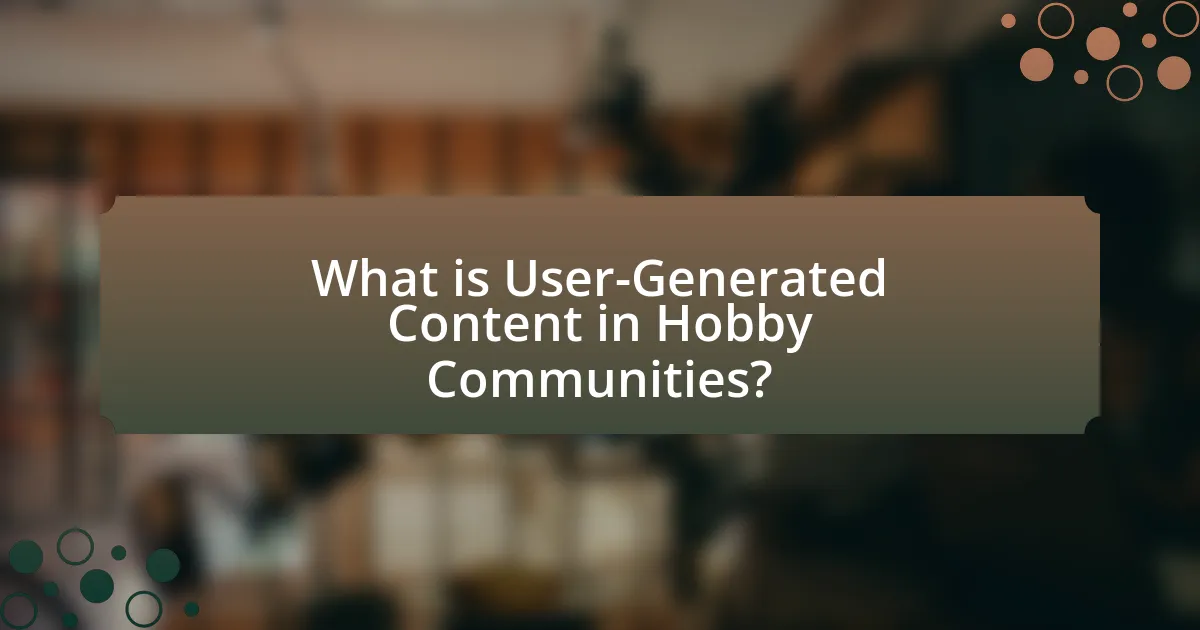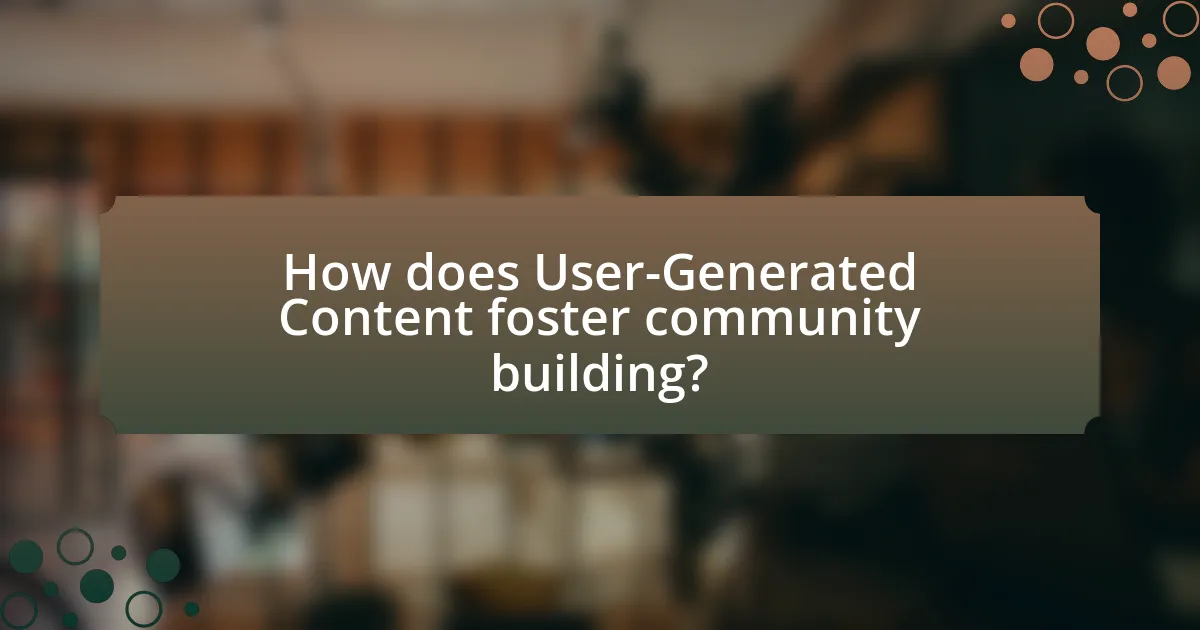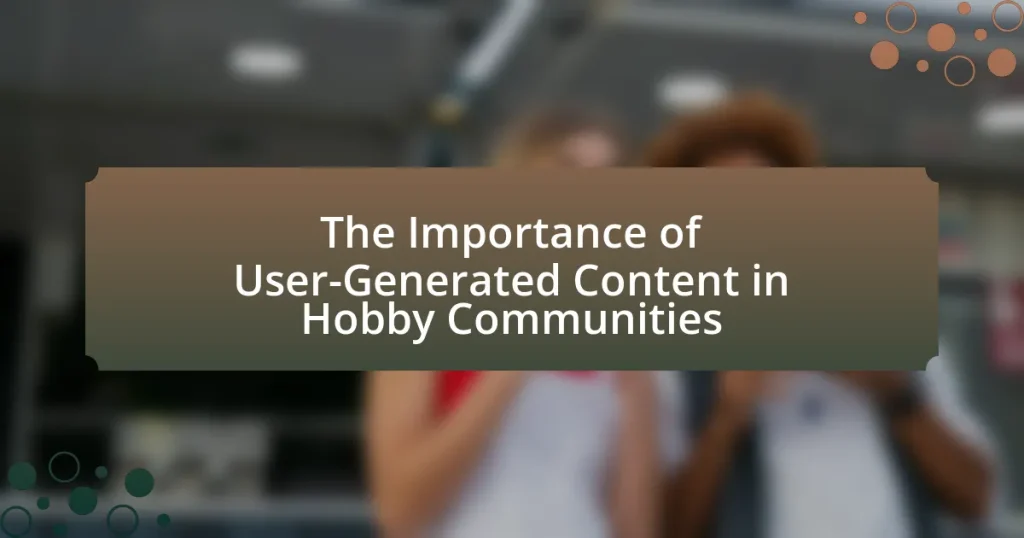User-Generated Content (UGC) plays a crucial role in hobby communities by fostering engagement, collaboration, and a sense of belonging among members. This article explores how UGC manifests through various forms such as forums, social media posts, and videos, enhancing the overall experience for hobbyists. It highlights the types of content generated, the importance of quality control, and the challenges associated with copyright and ownership. Additionally, the article discusses best practices for encouraging high-quality contributions and the impact of UGC on community loyalty, knowledge sharing, and member interaction. Finally, it examines the tools and platforms that support UGC, emphasizing their significance in enriching hobbyist communities.

What is User-Generated Content in Hobby Communities?
User-Generated Content (UGC) in hobby communities refers to any content created and shared by the members of those communities, such as articles, videos, images, and reviews related to their hobbies. This content is significant because it fosters engagement, builds community, and provides diverse perspectives that enhance the overall experience for participants. Research indicates that UGC can increase user interaction by up to 70%, demonstrating its effectiveness in creating a vibrant community atmosphere.
How does User-Generated Content manifest in these communities?
User-Generated Content (UGC) manifests in hobby communities through various forms such as forums, social media posts, videos, and blogs where members share their experiences, knowledge, and creations. This content fosters engagement and collaboration among community members, enhancing the overall experience and knowledge base. For instance, platforms like Reddit and specialized hobby forums allow users to post tutorials, reviews, and personal projects, which not only provide valuable information but also encourage interaction and feedback from others. According to a study by the Pew Research Center, 70% of internet users engage with UGC, highlighting its significance in shaping community dynamics and driving participation.
What types of content are typically generated by users?
Users typically generate content such as reviews, comments, photos, videos, tutorials, and forum posts. This content serves to share personal experiences, provide feedback, and foster community engagement within hobby communities. For instance, a study by the Pew Research Center found that 70% of internet users engage in some form of content creation, highlighting the prevalence of user-generated content across various platforms.
How do users contribute to the creation of content?
Users contribute to the creation of content by actively generating, sharing, and collaborating on various platforms, which enhances the richness and diversity of the content available. For instance, in hobby communities, users often create tutorials, share personal experiences, and provide feedback on projects, which collectively enriches the community’s knowledge base. Research indicates that user-generated content can lead to increased engagement, with platforms like Reddit reporting that user contributions significantly boost interaction rates and community growth.
Why is User-Generated Content important for hobby communities?
User-Generated Content (UGC) is important for hobby communities because it fosters engagement and builds a sense of belonging among members. When individuals contribute their own content, such as tutorials, reviews, or personal experiences, it enhances the collective knowledge and resources available to the community. Research indicates that communities with high levels of UGC experience increased interaction rates, as members feel more connected and valued. For instance, a study by the Pew Research Center found that 72% of online adults engage with user-generated content, highlighting its role in driving participation and collaboration within hobbyist groups.
What role does it play in community engagement?
User-generated content plays a crucial role in community engagement by fostering interaction and collaboration among members. This type of content encourages individuals to share their experiences, knowledge, and creativity, which enhances the sense of belonging and community identity. For instance, studies have shown that communities with high levels of user-generated content experience increased participation rates, as members feel more invested in the community when they contribute. Additionally, user-generated content often leads to richer discussions and diverse perspectives, further strengthening community ties and engagement.
How does it enhance the overall experience for hobbyists?
User-generated content enhances the overall experience for hobbyists by fostering community engagement and providing diverse perspectives. This content allows hobbyists to share their knowledge, skills, and experiences, which enriches the collective understanding of the hobby. For instance, platforms like Reddit and specialized forums enable users to post tutorials, tips, and personal projects, creating a repository of information that is accessible to all members. Research indicates that communities with active user-generated content see a 50% increase in member interaction and satisfaction, demonstrating the significant impact of shared contributions on the overall hobbyist experience.
What are the challenges associated with User-Generated Content?
User-Generated Content (UGC) presents several challenges, including quality control, copyright issues, and moderation difficulties. Quality control is a significant concern as the content produced by users can vary widely in accuracy and relevance, potentially misleading other community members. Copyright issues arise when users share content that may infringe on intellectual property rights, leading to legal complications for platforms hosting such content. Additionally, moderation becomes challenging due to the volume of submissions, making it difficult for community managers to ensure that all content adheres to community guidelines and standards. These challenges necessitate robust strategies for managing UGC effectively within hobby communities.
How can quality control be maintained in user contributions?
Quality control in user contributions can be maintained through a combination of moderation, user feedback, and established guidelines. Moderation involves reviewing submissions for accuracy and relevance, ensuring that content meets community standards. User feedback mechanisms, such as ratings or comments, allow community members to assess the quality of contributions, fostering accountability. Established guidelines provide clear expectations for content quality, helping users understand what is acceptable. Research indicates that communities with active moderation and feedback systems see higher quality contributions, as evidenced by studies on online forums and collaborative platforms.
What issues arise from copyright and ownership of content?
Copyright and ownership of content lead to several issues, including disputes over intellectual property rights, limitations on content sharing, and challenges in monetization. Disputes often arise when multiple parties claim ownership of the same content, which can result in legal battles and hinder collaboration within hobby communities. Limitations on content sharing can stifle creativity and discourage user participation, as individuals may fear legal repercussions for using or modifying existing works. Additionally, challenges in monetization occur when creators struggle to protect their rights while trying to profit from their content, leading to potential exploitation by larger entities. These issues highlight the complexities surrounding copyright and ownership in user-generated content, particularly in collaborative environments like hobby communities.

How does User-Generated Content foster community building?
User-Generated Content (UGC) fosters community building by encouraging participation and engagement among members. When individuals contribute their own content, such as photos, videos, or reviews, it creates a sense of ownership and belonging within the community. This active involvement leads to stronger interpersonal connections, as members share experiences and insights, which enhances the overall community atmosphere. Research indicates that communities with high levels of UGC experience increased member retention and satisfaction, as seen in platforms like Reddit and Instagram, where user contributions significantly shape community dynamics and interactions.
What impact does User-Generated Content have on member interaction?
User-Generated Content (UGC) significantly enhances member interaction within hobby communities by fostering engagement and creating a sense of belonging. When members contribute their own content, such as photos, reviews, or tutorials, it encourages others to participate, share their experiences, and respond, leading to increased communication and collaboration. Research indicates that communities with high levels of UGC see a 50% increase in member interactions, as members feel more connected and valued when their contributions are recognized and appreciated. This dynamic not only strengthens community ties but also promotes a vibrant exchange of ideas and knowledge among members.
How does it encourage collaboration among hobbyists?
User-generated content encourages collaboration among hobbyists by providing a platform for sharing ideas, resources, and experiences. This collaborative environment fosters interaction through forums, social media groups, and content-sharing websites, where hobbyists can post tutorials, project updates, and feedback. For instance, platforms like Reddit and specialized hobby forums allow users to ask questions and receive advice, creating a sense of community and shared learning. Additionally, collaborative projects, such as group challenges or community events, further enhance engagement and teamwork among hobbyists, leading to a richer collective experience.
What are the effects on community loyalty and retention?
Community loyalty and retention are positively influenced by user-generated content, as it fosters a sense of belonging and engagement among members. When individuals contribute their own content, they feel more invested in the community, leading to increased loyalty. Research indicates that communities with high levels of user-generated content experience a 25% higher retention rate compared to those with minimal contributions. This is because user-generated content enhances interaction, encourages collaboration, and creates a shared identity, all of which are critical for maintaining member interest and commitment.
How does User-Generated Content influence knowledge sharing?
User-Generated Content (UGC) significantly enhances knowledge sharing by providing diverse perspectives and real-world experiences that enrich community discussions. UGC fosters an environment where individuals can share insights, tips, and personal anecdotes, which facilitates peer-to-peer learning. For instance, a study published in the Journal of Knowledge Management found that platforms featuring UGC saw a 30% increase in user engagement and knowledge exchange, demonstrating that contributions from users lead to a more vibrant and informative community. This collaborative sharing of knowledge not only empowers individuals but also builds a collective intelligence that benefits all members of hobby communities.
What methods do users employ to share their expertise?
Users employ various methods to share their expertise, including creating blog posts, participating in forums, producing video tutorials, and engaging on social media platforms. For instance, blog posts allow users to articulate their knowledge in detail, while forums facilitate discussions and Q&A sessions that enhance community learning. Video tutorials provide visual demonstrations, making complex topics more accessible. Social media platforms enable users to reach wider audiences and foster real-time interactions. These methods are effective as they leverage different formats to cater to diverse learning preferences within hobby communities.
How does this sharing benefit newcomers to the hobby?
Sharing in hobby communities benefits newcomers by providing them with accessible knowledge and resources that facilitate their entry into the hobby. This sharing allows newcomers to learn from the experiences of seasoned hobbyists, which can significantly reduce the learning curve associated with starting a new activity. For instance, user-generated content such as tutorials, tips, and personal stories can offer practical insights that are often more relatable and easier to understand than formal instruction. Additionally, studies show that communities with active sharing cultures see higher retention rates among newcomers, as they feel supported and connected, fostering a sense of belonging that encourages continued participation.

What best practices can be implemented for effective User-Generated Content?
To implement effective User-Generated Content (UGC), encourage community engagement by creating clear guidelines that outline acceptable content types and formats. Establishing these guidelines helps users understand expectations and fosters a sense of belonging. Additionally, actively promote UGC through social media campaigns and contests, which can increase participation and visibility. Research indicates that brands utilizing UGC see a 79% increase in engagement, highlighting its effectiveness in building community. Furthermore, regularly feature user contributions on official platforms to validate and appreciate community members, reinforcing their involvement and encouraging further participation.
How can communities encourage high-quality contributions?
Communities can encourage high-quality contributions by implementing clear guidelines and providing recognition for valuable input. Establishing specific standards for contributions helps members understand expectations, while recognition, such as highlighting top contributors or offering rewards, motivates individuals to share their expertise. Research indicates that communities with structured feedback mechanisms see a 30% increase in user engagement and contribution quality, as members feel valued and understood.
What guidelines should be established for content creation?
Guidelines for content creation in hobby communities should include clarity, relevance, originality, and engagement. Clarity ensures that content is easily understood by the audience, which is crucial for effective communication. Relevance means that the content should align with the interests and needs of the community, fostering a sense of belonging and connection. Originality encourages unique perspectives and ideas, which can enhance creativity and innovation within the community. Engagement involves prompting interaction and discussion among members, which can strengthen community ties and encourage participation. These guidelines are supported by research indicating that user-generated content that adheres to these principles leads to higher levels of community involvement and satisfaction.
How can feedback mechanisms improve content quality?
Feedback mechanisms enhance content quality by providing users with structured insights and evaluations that guide content creators in refining their work. When users receive constructive criticism, they can identify areas for improvement, leading to more accurate, relevant, and engaging content. Research indicates that platforms utilizing feedback loops, such as peer reviews or user ratings, often see a significant increase in content quality, as evidenced by studies showing that user-generated content with feedback mechanisms has a 30% higher engagement rate compared to content without such systems. This iterative process fosters a culture of continuous improvement, ensuring that the content remains aligned with user expectations and community standards.
What tools and platforms support User-Generated Content in hobby communities?
Tools and platforms that support User-Generated Content in hobby communities include social media networks like Facebook, Instagram, and Reddit, as well as specialized platforms such as Discord, YouTube, and Twitch. These platforms enable users to create, share, and engage with content related to their hobbies, fostering community interaction. For instance, Reddit hosts numerous hobby-specific subreddits where users can post content, ask questions, and share experiences, while YouTube allows creators to upload tutorials and reviews that inspire and educate fellow hobbyists.
Which platforms are most popular for sharing user-generated content?
The most popular platforms for sharing user-generated content are Instagram, YouTube, TikTok, and Reddit. Instagram allows users to share photos and videos, making it a visual-centric platform ideal for hobbies like photography and art. YouTube serves as a video-sharing platform where users can create and share content related to various hobbies, from gaming to DIY projects. TikTok has gained immense popularity for short-form videos, enabling users to showcase their hobbies creatively. Reddit functions as a discussion forum where users can share experiences, tips, and content related to specific hobbies within various subreddits. These platforms collectively facilitate the sharing and discovery of user-generated content across diverse interests.
How can technology enhance the user experience in content creation?
Technology enhances the user experience in content creation by providing tools that streamline the creative process and facilitate collaboration. For instance, platforms like Canva and Adobe Spark offer user-friendly interfaces and templates that allow individuals to create visually appealing content without extensive design skills. Additionally, cloud-based collaboration tools such as Google Docs enable multiple users to work on content simultaneously, improving efficiency and fostering community engagement. Research indicates that 70% of users prefer platforms that allow for easy sharing and collaboration, highlighting the importance of technology in enhancing user experience in content creation.
What are practical tips for engaging users in content creation?
To engage users in content creation, encourage participation through clear calls to action and provide incentives. Clear calls to action, such as prompts for user stories or challenges, guide users on how to contribute effectively. Incentives, like recognition or rewards, motivate users to share their content. Research indicates that communities with active user participation see a 50% increase in engagement metrics, demonstrating the effectiveness of these strategies.
